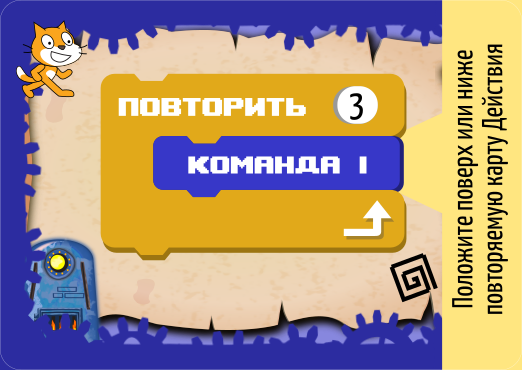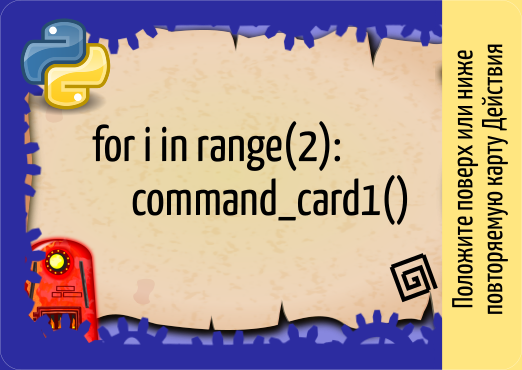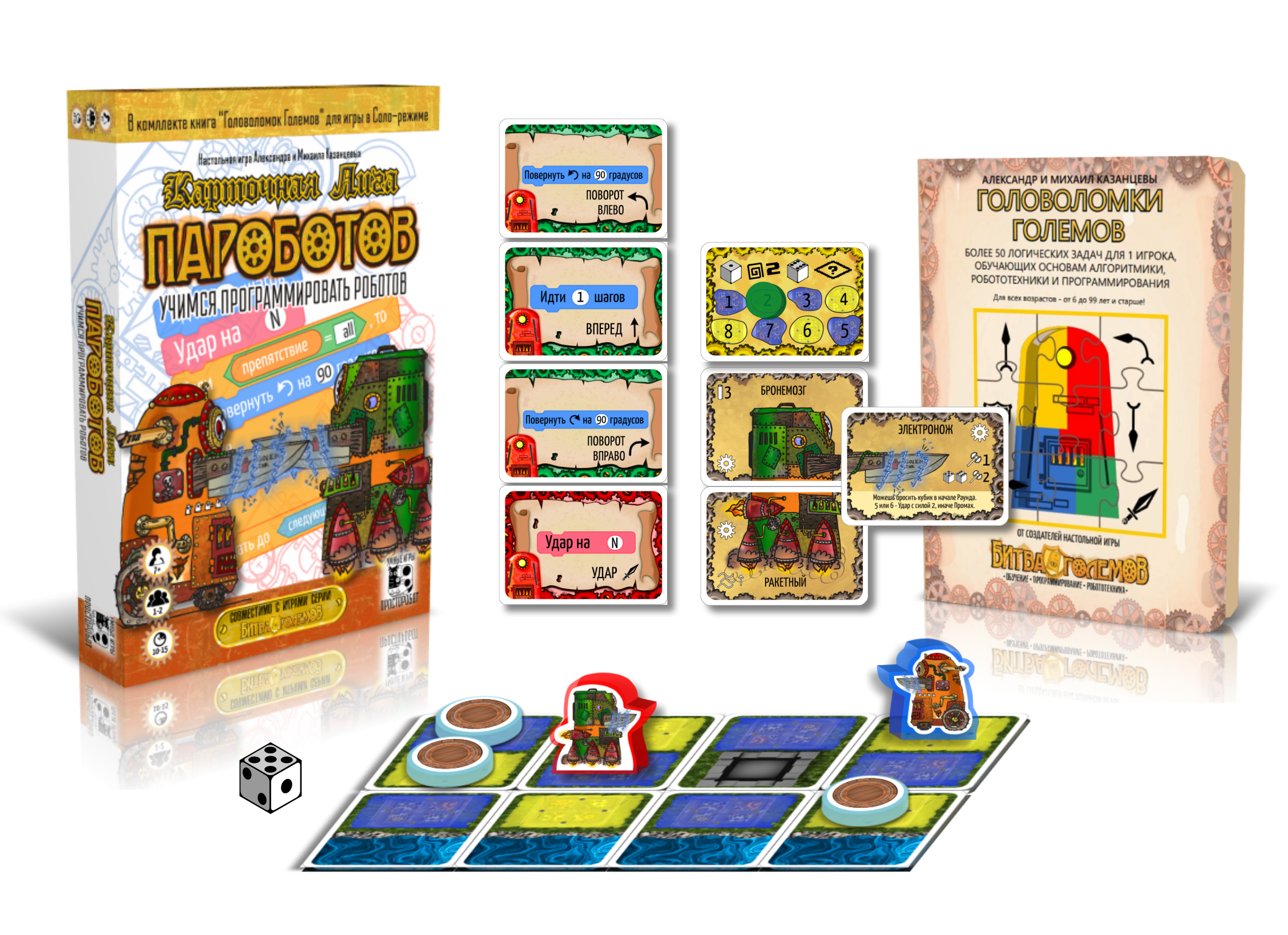How did we make cardboard code or the Scratch version of the board game Golem Battle
A board game that teaches the basics of programming and robotics “Golem Battle” for 5 years. And the game continues to live and develop. You can read about the ideas that we put in there and the development of the first edition in this article .
But now we will talk about a rather dramatic change in the methodological and visual component that we ventured to bring into the game, including due to the requests of parents and teachers. The game two editions lasted almost unchanged by the method of visualizing program code, which was based on flowcharts, but in the third edition we “surrendered”
But we were also asked to connect the game not only with the school curriculum and textbooks, but also with the languages and programming environments that the children studied at the initial stage, namely Scratch and Python. All the same, our game is aimed at children 7-10 years old and it is these environments and languages that were most in demand.
But you can look at the initial development table, where you can see that we worked out not only them:

The development of such team maps (namely, they specify the program for your Golem robot) began back in 2017. Based on the current version of Scratch 2 at that time, we redid the main commands to a block type:

Here's what the Python map example looked like:

Then we gave the PDF files for testing to parents and teachers (the Python version can still be downloaded, since we do not plan to publish it yet) and in the end we got feedback that the children ... began to get confused. They were confused before, but more in the position of the Robots and their orientation on the field, but not in teams (maximum in difficult cycles and conditions with sensors). Now, the children were simply confusing the teams, as some started the game earlier than mastered the Scratch environment and did not save even the explanatory icons.
We decided not to touch the Python commands, but we had to add a text explanation to the blocks. For all the tests, 2018 almost passed, the unsuccessful launch of the pre-order at its end, the onset of 2019, and with it ... the transition to the 3rd version of Scratch.
We had to stock up on a new color map of the blocks and redraw all the cards again, simultaneously improving them (and removing the Scratch kitten, since we were not allowed to add it).
The result can be seen in this example. On the left is the map of the “classic” Golem Battle, and on the right is the Scratch representation:

Adults brought up on classical flowcharts may argue that it has now become worse, but testing “on children” has shown that they perceive cards in this way well and draw parallels between the computer and the cardboard environment.
The only thing that we were correctly advised was to increase the contrast of colors (making the background lighter and the colors of the blocks brighter) and increase the size of the infographic duplicate icons.
The new edition was called the “ Battle of Golems. Card League of Parobots ” and in addition to changing team cards, we reworked the principle of constructing the playing field, mechanisms for building robots and made other changes, which allowed us to put the game in the psychological ceiling “up to 1000 rubles”. And as with our other games, we will publish it through crowdfunding and will be happy if you support the game.

We hope that this edition will be successful, and we decided to make Python (and soon Java) team maps, as well as the "classic" version of the Golem Battle, freely distributed and downloadable .
But now we will talk about a rather dramatic change in the methodological and visual component that we ventured to bring into the game, including due to the requests of parents and teachers. The game two editions lasted almost unchanged by the method of visualizing program code, which was based on flowcharts, but in the third edition we “surrendered”
But we were also asked to connect the game not only with the school curriculum and textbooks, but also with the languages and programming environments that the children studied at the initial stage, namely Scratch and Python. All the same, our game is aimed at children 7-10 years old and it is these environments and languages that were most in demand.
But you can look at the initial development table, where you can see that we worked out not only them:

The development of such team maps (namely, they specify the program for your Golem robot) began back in 2017. Based on the current version of Scratch 2 at that time, we redid the main commands to a block type:

Here's what the Python map example looked like:

Then we gave the PDF files for testing to parents and teachers (the Python version can still be downloaded, since we do not plan to publish it yet) and in the end we got feedback that the children ... began to get confused. They were confused before, but more in the position of the Robots and their orientation on the field, but not in teams (maximum in difficult cycles and conditions with sensors). Now, the children were simply confusing the teams, as some started the game earlier than mastered the Scratch environment and did not save even the explanatory icons.
We decided not to touch the Python commands, but we had to add a text explanation to the blocks. For all the tests, 2018 almost passed, the unsuccessful launch of the pre-order at its end, the onset of 2019, and with it ... the transition to the 3rd version of Scratch.
We had to stock up on a new color map of the blocks and redraw all the cards again, simultaneously improving them (and removing the Scratch kitten, since we were not allowed to add it).
The result can be seen in this example. On the left is the map of the “classic” Golem Battle, and on the right is the Scratch representation:

Adults brought up on classical flowcharts may argue that it has now become worse, but testing “on children” has shown that they perceive cards in this way well and draw parallels between the computer and the cardboard environment.
The only thing that we were correctly advised was to increase the contrast of colors (making the background lighter and the colors of the blocks brighter) and increase the size of the infographic duplicate icons.
The new edition was called the “ Battle of Golems. Card League of Parobots ” and in addition to changing team cards, we reworked the principle of constructing the playing field, mechanisms for building robots and made other changes, which allowed us to put the game in the psychological ceiling “up to 1000 rubles”. And as with our other games, we will publish it through crowdfunding and will be happy if you support the game.

We hope that this edition will be successful, and we decided to make Python (and soon Java) team maps, as well as the "classic" version of the Golem Battle, freely distributed and downloadable .
All Articles